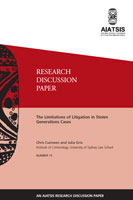The Limitations of Litigation in Stolen Generations Cases
The purpose of this Discussion Paper is to review the progress of litigation by members of the Stolen Generations before the courts in Australia. The National Inquiry into the Separation of Aboriginal and Torres Strait Islander Children from Their Families found that forcible removal breached a range of domestic laws and international human rights standards. Yet, despite this finding, court action by members of the Stolen Generations has been unsuccessful. It is our purpose to consider these failures in more detail.
This Discussion Paper sets out the key applicants and their legal claims, followed by the various and, at times, unique difficulties confronting Stolen Generation claimants before the courts. Our analysis is from a socio-legal perspective that places in context the experiences of Indigenous persons who have sought to use the legal system.
The major limitations of the litigation process which we identify include the problem of overcoming statutory limitation periods, the difficulty of locating evidence, the emotional and psychological trauma experienced by claimants in the hostile environment of an adversarial court system, the enormous financial cost and time involved, the problem of establishing specific liability for harms that have been caused, and the problem of overcoming the judicial view that ‘standards of the time’ justified removal in the best interests of the child.
We conclude by noting the importance of alternative approaches to achieving justice for the Stolen Generations.
